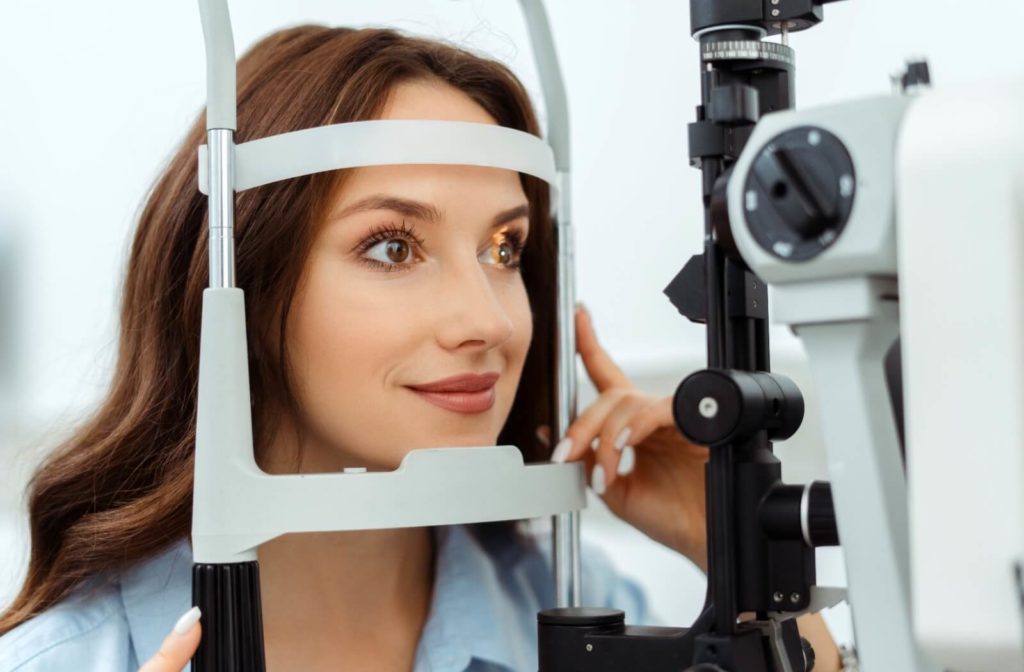Comprehensive eye exams are important for maintaining eye and overall health. Most adults should undergo a comprehensive eye exam at least once every 2 years, while children and seniors should see their optometrist at least once a year.
Of course, fitting an eye appointment into a busy schedule can be a hassle. Patients often ask us, “How long will this take?”
Comprehensive eye exams normally take 30 minutes to an hour if your eyes are generally healthy. If your optometrist discovers issues during the exam or if you have another health condition that makes eye exams more complicated, the exam may take longer.
What Is a Comprehensive Eye Exam?
A comprehensive eye exam allows your optometrist to inspect your eyes’ visual abilities and monitor your eye and overall health. Not only do comprehensive eye exams let your optometrist detect any potential issues with your eye health, but they can also reveal signs of diseases in other parts of the body.
Comprehensive eye exams are more detailed compared to other types of vision testing. Vision assessments available on opticians’ websites or during driver’s license evaluations typically focus solely on evaluating your visual acuity (i.e., determining if you require corrective glasses) and occasionally include tests for colour vision. Comprehensive eye exams give your optometrist a much fuller picture of your eye health and can detect issues that other vision tests simply can’t.
It’s especially important for children to have regular eye exams. Many eye diseases, like myopia (nearsightedness), begin in childhood and worsen over time. Untreated vision problems can affect your child’s ability to learn and have other long-term effects. The earlier you discover potential issues, the easier it will be for your optometrist to treat them.
What’s Involved in a Comprehensive Eye Exam?
According to the Canadian Association of Optometrists, most comprehensive eye exams have several components:
- Patient history: Your optometrist will ask questions about your overall health, any previous eye health issues, and whether you have a family history of eye disease.
- Functional history: Your optometrist will ask about your visual needs, such as the kind of work you do and the visual conditions of your normal work setting.
- Colour vision evaluation: A test to determine how well you can distinguish colours.
- Binocular vision assessment: Your optometrist will examine how well your eyes work in coordination with each other, which is important for spotting conditions like amblyopia (lazy eye).
- Eye health assessment: Your optometrist will assess the health of the physical tissues in and around your eye. This can include factors like the size and shape of your eyes, the size and health of the blood vessels inside your eyes, and the health of the muscles that control your eye movement.
- Neurological assessment: Your optometrist will test how well your eyes react to certain stimuli, like how well your pupils dilate or contract in response to changes in light. This is important for detecting problems with the ocular nerve and other eye-related parts of the nervous system.
- Visual acuity testing and refractive correction: The part that most people think of when they think of an “eye exam” is visual acuity testing and refractive correction, which measure how light passes through the eye to determine whether you need corrective lenses (glasses or contacts).
How Often Should I Have a Comprehensive Eye Exam?
Different groups of people will need to have comprehensive eye exams more or less often. In general, the Canadian Association of Optometrists recommends that:
- Infants and toddlers should have their first eye exam at 6 to 9 months and a second eye exam when they’re between 2 and 5 years old.
- Children and teens aged 5–19 should have an eye exam at least once per year.
- Adults aged 20–64 should have an eye exam once every 2 years.
- Seniors aged 65+ should have an eye exam once per year.
- Anyone with diabetes or other sight-threatening conditions should have an eye exam at least once per year.
If you have ongoing vision problems, your optometrist may recommend you come in for eye exams more often.
Booking Your Next Eye Exam
Eye appointments are an important part of keeping you and your eyes healthy. Spending a little time with your optometrist every year or 2 can save you a lot of trouble in the future. If you’re interested in booking a comprehensive eye exam with Queensway Optometric Centre, contact us for an appointment today!


